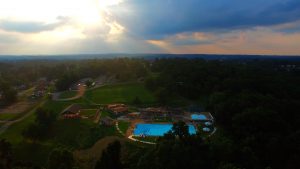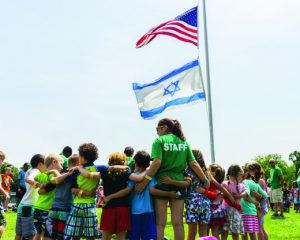- Center for Loving Kindness
- Fitness & Wellness
- JCC Camps
- Sports, Aquatics & Dance
- Early Childhood
- Children, Teens & Family
- Adults
- Jewish Life, Arts, Events, Rentals
- Giving
Creating an Inclusive Camp
Posted by
Rachael Speck, Division Director JCC Day Camps on February 17, 2023
 Summer camp can be a magical experience – carefree days spent outdoors, swimming, sports, singing, cheering and the list goes on. But for families who have children with hidden disabilities – sensory challenges, ADHD, autism, emotional dysregulation – summer camp can be the best experience or the worst.
Summer camp can be a magical experience – carefree days spent outdoors, swimming, sports, singing, cheering and the list goes on. But for families who have children with hidden disabilities – sensory challenges, ADHD, autism, emotional dysregulation – summer camp can be the best experience or the worst.
Leah’s 5-year-old son, Austin, was a camper at J&R Day Camp last summer and will be returning this summer.
“The JCC cares about finding a solution to make their programs inclusive for neurodivergent kids. It is incredibly comforting to know that the right support is in place to help him succeed.”
Austin is a happy, curious, creative child. He loves to swim and be outside, especially at camp. He is a talented builder, especially with Legos and blocks, and is particularly skilled at puzzles for his age. He gets overstimulated easily, particularly around new people and activities, or when there is just a lot of excitement. He sometimes has a hard time controlling his body, responding to questions and following directions. Leah worries most about his social interactions and whether his behavior will be misunderstood by peers or adults as unkind, “bad” or “out of control” since he has not yet developed certain skills that his peers have like impulse control, flexibility, and frustration management. Some conventional behavior approaches don’t work well with Austin and can often escalate situations.
 At J&R Day Camp, thanks to our partnership with Connection, Counseling & Consultation led by April Artz LPC, we are taking steps to change some of the ways we do things so that more kids like Austin can be successful at camp. How? Intensive training on and implementation of Positive Behavior Support (PBS) strategies, increasing our number of inclusion staff, and serving as a practicum field placement site for master’s degree level interns to gain experience in this area at the benefit our campers.
At J&R Day Camp, thanks to our partnership with Connection, Counseling & Consultation led by April Artz LPC, we are taking steps to change some of the ways we do things so that more kids like Austin can be successful at camp. How? Intensive training on and implementation of Positive Behavior Support (PBS) strategies, increasing our number of inclusion staff, and serving as a practicum field placement site for master’s degree level interns to gain experience in this area at the benefit our campers.
What worked well with Austin was positive reinforcement with a very simple daily reward chart. This was largely successful because his unit leader and counselor were checking in with him between activities, constantly giving praise and focusing on his good choices or if the goal wasn’t achieved, he would simply be encouraged to try again and “earn a star” next activity period. “I think this regular 1:1 connection was a big part of reminding Austin the framework for being successful and providing the reinforcement,” says Leah.
Additionally, our inclusion team worked with Austin’s family early in the summer to make a plan to set him up for success. “I know their days were busy supporting many different campers, so it meant so much to me that they were giving Austin the extra time and care and that they prioritized keeping me updated,” says Leah. He was given extra opportunities to calm down independently, goals to work toward that earned him rewards, cool down strategies to practice and fidget toys. Austin’s parents received regular check-ins from inclusion staff and camp leadership, particularly in the early weeks of the summer when the plan was still being created. “I always knew I would be able to get a reliable sense of how things were going for Austin at camp.”
These small but impactful efforts can go a long way towards making or breaking a family’s camp experience.
“I have heard multiple stories about the way preschools or camps typically handle ‘behavior issues,’ making the parents feel like they are on their own to fix the situation or be asked to leave the program, causing a lot of stress for both the child and parents. In these cases, inclusion efforts like what J&R has put in place could have helped the child, leading to increased self-confidence and independence,” says Leah.
February is Jewish Disabilities Awareness, Acceptance and Inclusion month which is a unified effort among Jewish organizations worldwide to raise awareness and foster inclusion of people with disabilities and their loved ones. While this effort brings the issues of disability inclusion to the forefront, inclusion is something that we at the JCC have never been more intently focused on. Too many of our kids are unnecessarily falling through the cracks simply because their brains are wired differently. In our quest to include more children in our camp community, children like Austin teach us that a little support can go a long way and benefit ALL campers and staff, regardless of their abilities or challenges.
“I think what the JCC is doing connected to inclusion is so important because kids with such needs are going through their own development process and learning along with their parents the particular strategies that work best to build life skills. However, during this learning curve, the feeling of being excluded or feeling like a ‘bad kid’ can cause emotional distress for kids and parents. Being in such a supportive, non-judgmental environment like J&R Day Camp has a lasting and positive impact on the happiness of the whole family.”
Blog Categories
- Adults (176)
- Arts + Events (68)
- Camps (52)
- Center for Loving Kindness (111)
- Children, Teens, & Family (134)
- Community Spotlight (87)
- Early Childhood (42)
- Fitness + Wellness (131)
- Happenings (62)
- History 120 Years (34)
- Jewish Life (128)
- Maccabi (4)
- Member Experience (56)
- News (58)
- Nutrition (19)
- Sports, Aquatics, & Dance (38)
- Teens (2)
- Uncategorized (151)
- Weekly Tips (82)



